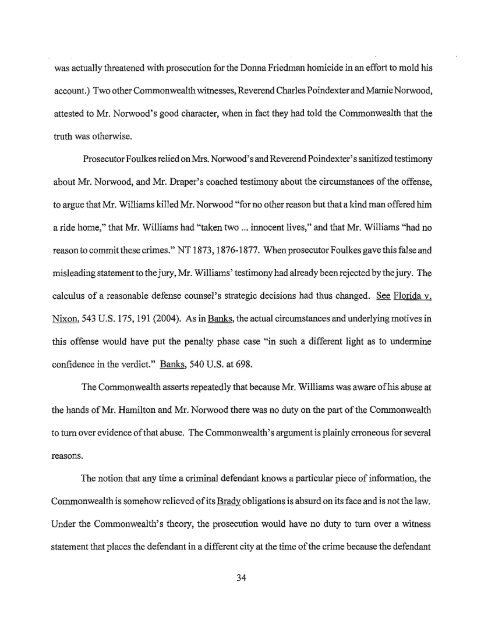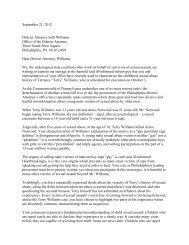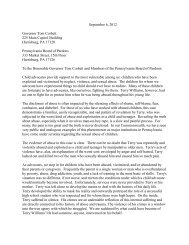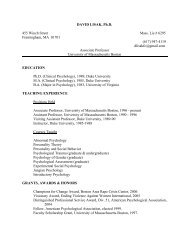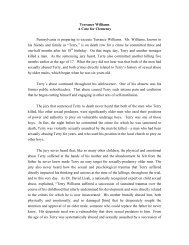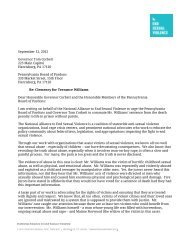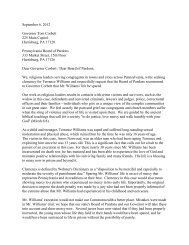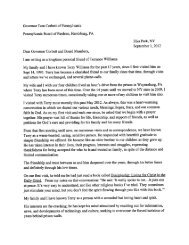Response in Opposition to the Commonwealth's Motion to Vacate
Response in Opposition to the Commonwealth's Motion to Vacate
Response in Opposition to the Commonwealth's Motion to Vacate
You also want an ePaper? Increase the reach of your titles
YUMPU automatically turns print PDFs into web optimized ePapers that Google loves.
was actually threatened with prosecution for <strong>the</strong> Donna Friedman homicide <strong>in</strong> an effort <strong>to</strong> mold hisaccount.) Two o<strong>the</strong>r Commonwealth witnesses, Reverend Charles Po<strong>in</strong>dexter and Mamie Norwood,attested <strong>to</strong> Mr. Norwood's good character, when <strong>in</strong> fact <strong>the</strong>y had <strong>to</strong>ld <strong>the</strong> Commonwealth that <strong>the</strong>truth was o<strong>the</strong>rwise.Prosecu<strong>to</strong>r Foulkes relied on Mrs. Norwood's and Reverend Po<strong>in</strong>dexter's sanitized testimonyabout Mr. Norwood, and Mr. Draper's coached testimony about <strong>the</strong> circumstances of <strong>the</strong> offense,<strong>to</strong> argue that Mr. Williams killed Mr. Norwood "for no o<strong>the</strong>r reason but that a k<strong>in</strong>d man offered hima ride home," that Mr. Williams had "taken two ... <strong>in</strong>nocent lives," and that Mr. Williams "had noreason <strong>to</strong> commit <strong>the</strong>se crimes." NT 1873, 1876-1877. When prosecu<strong>to</strong>r Foulkes gave this false andmislead<strong>in</strong>g statement <strong>to</strong> <strong>the</strong> jury, Mr. Williams' testimony had already been rejected by <strong>the</strong> jury. Thecalculus of a reasonable defense counsel's strategic decisions had thus changed. See Florida v.Nixon, 543 U.S. 175, 191 (2004). As <strong>in</strong> Banks, <strong>the</strong> actual circumstances and underly<strong>in</strong>g motives <strong>in</strong>this offense would have put <strong>the</strong> penalty phase case "<strong>in</strong> such a different light as <strong>to</strong> nnderm<strong>in</strong>econfidence <strong>in</strong> <strong>the</strong> verdict." Banks, 540 U.S. at 698.The Commonwealth asserts repeatedly that because Mr. Williams was aware of his abuse at<strong>the</strong> hands of Mr. Hamil<strong>to</strong>n and Mr. Norwood <strong>the</strong>re was no duty on <strong>the</strong> part of <strong>the</strong> Commonwealth<strong>to</strong> turn over evidence of that abuse. The <strong>Commonwealth's</strong> argument is pla<strong>in</strong>ly erroneous for severalreasons.The notion that any time a crim<strong>in</strong>al defendant knows a particular piece of <strong>in</strong>formation, <strong>the</strong>Commonwealth is somehow relieved of its Brady obligations is absurd on its face and is not <strong>the</strong> law.Under <strong>the</strong> <strong>Commonwealth's</strong> <strong>the</strong>ory, <strong>the</strong> prosecution would have no duty <strong>to</strong> turn over a witnessstatement that places <strong>the</strong> defendant <strong>in</strong> a different city at <strong>the</strong> time of<strong>the</strong> crime because <strong>the</strong> defendant34


